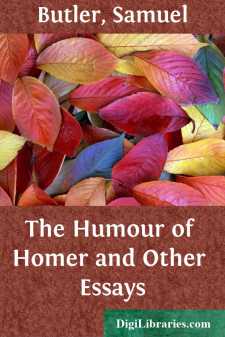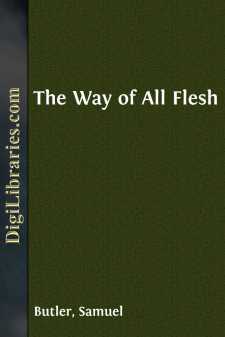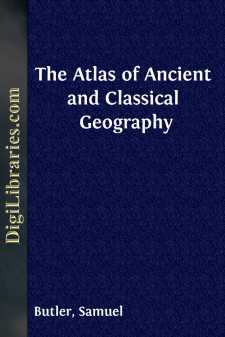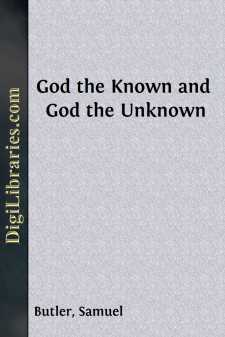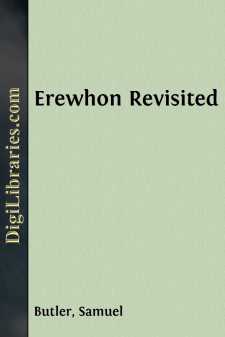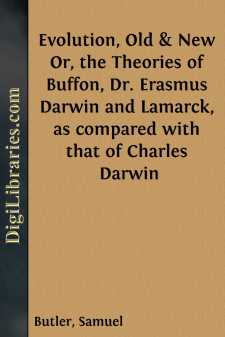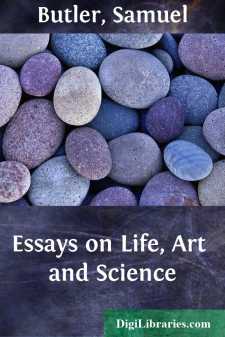Categories
- Antiques & Collectibles 13
- Architecture 36
- Art 48
- Bibles 22
- Biography & Autobiography 813
- Body, Mind & Spirit 142
- Business & Economics 28
- Children's Books 17
- Children's Fiction 14
- Computers 4
- Cooking 94
- Crafts & Hobbies 4
- Drama 346
- Education 46
- Family & Relationships 57
- Fiction 11829
- Games 19
- Gardening 17
- Health & Fitness 34
- History 1377
- House & Home 1
- Humor 147
- Juvenile Fiction 1873
- Juvenile Nonfiction 202
- Language Arts & Disciplines 88
- Law 16
- Literary Collections 686
- Literary Criticism 179
- Mathematics 13
- Medical 41
- Music 40
- Nature 179
- Non-Classifiable 1768
- Performing Arts 7
- Periodicals 1453
- Philosophy 64
- Photography 2
- Poetry 896
- Political Science 203
- Psychology 42
- Reference 154
- Religion 513
- Science 126
- Self-Help 84
- Social Science 81
- Sports & Recreation 34
- Study Aids 3
- Technology & Engineering 59
- Transportation 23
- Travel 463
- True Crime 29
Samuel Butler
Samuel Butler (1835–1902) was an English author, best known for his satirical novel "Erewhon," which critiques Victorian society and its institutions. He also wrote the posthumously published "The Way of All Flesh," a semi-autobiographical work that explores the generational conflict between a father and his son. Additionally, Butler was a notable critic of Charles Darwin's theories, offering alternative views on evolution in his works "Life and Habit" and "Evolution, Old and New."
Author's Books:
Sort by:
by:
Samuel Butler
PREFACE. I delayed these pages some weeks in order to give Mr. Romanes an opportunity of explaining his statement that Canon Kingsley wrote about instinct and inherited memory in Nature, Jan. 18, 1867. I wrote to the Athenæum (Jan. 26, 1884) and pointed out that Nature did not begin to appear till nearly three years after the date given by Mr. Romanes, and that there was nothing from Canon Kingsley...
more...
by:
Samuel Butler
IntroductionBy R. A. Streatfeild The nucleus of this book is the collection of essays by Samuel Butler, which was originally published by Mr. Grant Richards in 1904 under the title Essays on Life, Art and Science, and reissued by Mr. Fifield in 1908. To these are now added another essay, entitled “The Humour of Homer,” a biographical sketch of the author kindly contributed by Mr. Henry Festing...
more...
by:
Samuel Butler
CHAPTER I When I was a small boy at the beginning of the century I remember an old man who wore knee-breeches and worsted stockings, and who used to hobble about the street of our village with the help of a stick. He must have been getting on for eighty in the year 1807, earlier than which date I suppose I can hardly remember him, for I was born in 1802. A few white locks hung about his ears, his...
more...
by:
Samuel Butler
Book I THE GODS IN COUNCIL—MINERVA'S VISIT TO ITHACA—THE CHALLENGE FROM TELEMACHUS TO THE SUITORS. Tell me, O Muse, of that ingenious hero who travelled far and wide after he had sacked the famous town of Troy. Many cities did he visit, and many were the nations with whose manners and customs he was acquainted; moreover he suffered much by sea while trying to save his own life and bring his...
more...
by:
Samuel Butler
INTRODUCTION THE accompanying Atlas has been included in this series for the greater convenience of the reader of “Grote's Greece” and other works that ask a continual reference to maps of ancient and classical geography. The disadvantage of having to turn perpetually from the text of a volume to a map at its end, or a few pages away, is often enough to prevent the effective use of the one in...
more...
by:
Samuel Butler
CHAPTER I. INTRODUCTION MANKIND has ever been ready to discuss matters in the inverse ratio of their importance, so that the more closely a question is felt to touch the hearts of all of us, the more incumbent it is considered upon prudent people to profess that it does not exist, to frown it down, to tell it to hold its tongue, to maintain that it has long been finally settled, so that there is now no...
more...
by:
Samuel Butler
CHAPTER I: UPS AND DOWNS OF FORTUNE—MY FATHER STARTS FOR EREWHON Before telling the story of my father’s second visit to the remarkable country which he discovered now some thirty years since, I should perhaps say a few words about his career between the publication of his book in 1872, and his death in the early summer of 1891. I shall thus touch briefly on the causes that occasioned his failure...
more...
by:
Samuel Butler
BOOK I The quarrel between Agamemnon and Achilles—Achilles withdraws from the war, and sends his mother Thetis to ask Jove to help the Trojans—Scene between Jove and Juno on Olympus. Sing, O goddess, the anger of Achilles son of Peleus, that brought countless ills upon the Achaeans. Many a brave soul did it send hurrying down to Hades, and many a hero did it yield a prey to dogs and vultures, for...
more...
by:
Samuel Butler
Contrary to the advice of my friends, who caution me to avoid all appearance of singularity, I venture upon introducing a practice, the expediency of which I will submit to the judgment of the reader. It is one which has been adopted by musicians for more than a century—to the great convenience of all who are fond of music—and I observe that within the last few years two such distinguished painters...
more...
by:
Samuel Butler
INTRODUCTION It is hardly necessary to apologise for the miscellaneous character of the following collection of essays. Samuel Butler was a man of such unusual versatility, and his interests were so many and so various that his literary remains were bound to cover a wide field. Nevertheless it will be found that several of the subjects to which he devoted much time and labour are not represented in...
more...



